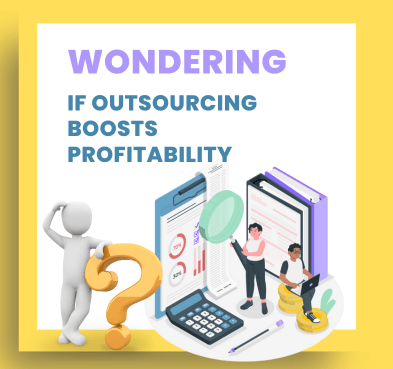Undoubtedly, the eCommerce industry is booming. This rapid growth of the industry has made it an attractive business model for many serial entrepreneurs. In fact, the nature of the business is so straightforward that even small business owners can jump in. However, there are several things that needs to be taken care of is eCommerce accounting services.
The existing business model of eCommerce industry brings a unique set of financial complexities. Certainly, managing finances efficiently is crucial to the success of any business. However, eCommerce businesses experience a range of distinct challenges. These include some of the following common challenges which makes need for effective accounting for eCommerce businesses evident and inevitable:
- Handling multiple sales channels
- Fluctuating inventory levels, and
- Ensuring compliance with various tax regulations.
As eCommerce operations continue to grow, maintaining accurate financial records becomes more demanding, yet crucial. Undoubtedly, there are several options to manage accounting for eCommerce business available in the 21st century. Certainly, eCommerce accounting services is one of the best options and it steps in as an essential solution.
Understanding eCommerce Accounting: What Sets It Apart
What Is eCommerce Accounting?
This type of accounting involves the financial management of online businesses, which can be B2B or B2C businesses. The eCommerce accountant near me or the offshore professional will focus on aspects that traditional accounting may not cover. Unlike standard accounting, which typically deals with more general transactions and bookkeeping, eCommerce accounting needs to account for various complexities such as:
- Multiple payment gateways
- International transactions
- Fluctuating inventory, and
- Diverse tax regulations.
These unique aspects make accounting an essential part of any online business’s operations. Moreover, it requires skills and expertise, which is easily available in offshore eCommerce accounting services.
Key Elements of Accounting for eCommerce
- Sales Tracking
Accurate sales tracking is crucial in eCommerce business. With sales occurring through different platforms like Shopify, Amazon, or eBay, maintaining precise records becomes challenging. Professional services covering accounting for eCommerce business offer real time sales tracking. Therefore, it ensures that businesses know exactly how much they are making from each platform. - Inventory Management
Traditional brick-and-mortar stores in eCommerce industry does not need to deal with rapidly changing stock levels due to high customer demand and varying product availability. However, this is pretty common issue in an online business.
Learn More About: Latest accounting trends to follow by Ecommerce Industry
The best eCommerce accounting services integrate inventory management systems that track stock levels in real time. This prevents issues like overselling or running out of stock, which can negatively impact revenue and customer satisfaction. Moreover, it ensures resolving concerns related to inventory management for the business owners.
- Tax Compliance
Taxation for eCommerce businesses can be incredibly complex. Be it sales tax, VAT, or GST, each region may have its own set of rules. Additionally, taxation compliance may vary from one nation to another and one state to another. Therefore, online businesses needs expert eCommerce accountant near me to carry out effective and accurate tax compliances without a miss.
The accounting for eCommerce business help businesses navigate these regulations and ensure compliance, so they avoid penalties and legal issues.
- Cash Flow Monitoring
Unquestionably, monitoring cash flow is vital for the survival of any business. When we talk about eCommerce businesses, they often face fluctuations in cash flow due to seasonal changes, promotions, or returns. Often, eCommerce accounting services help track these fluctuations. Moreover, it provides insights that can help business owners make informed financial decisions.
Unique Challenges to eCommerce Businesses
Undoubtedly, running an eCommerce business is much more challenging than traditional brick-and-mortar models. Let’s take a look at 5 major challenges eCommerce businesses face day in, day out. This will also give a hint on why having a professional provider for accounting for eCommerce is a must.
1. Balancing Inventory Across Multiple Channel
Effective inventory management is crucial for eCommerce businesses to avoid stockouts or overstocking. With products sold across multiple channels and sometimes in different regions, keeping track of stock levels and ensuring timely replenishment can be complex. Inaccurate inventory data can lead to overselling, underselling, and incorrect financial reporting.
2. Navigating Multiple Sales Platforms
eCommerce businesses often sell products across various platforms such as websites, marketplaces (like Amazon or eBay), social media, and mobile apps. Each of these channels may have its own set of rules, fees, and transaction processes. This can lead to discrepancies in financial data and make it difficult to track sales and expenses accurately across all platforms.
3. Managing Complex Pricing Models in Real-Time
Many eCommerce businesses use dynamic pricing, which means adjusting prices based on demand, inventory levels, and competitor pricing. While this approach can help maximize sales, it also creates challenges in accounting. According to eCommerce accountant near me as businesses must continuously update and reconcile pricing changes in real time. This ensures accurate reporting of revenue and profits.
4. Tracking the Impact of Flash Sales and Promotions
Promotions, discounts, and flash sales are common strategies in eCommerce to attract customers. While these tactics can boost sales, they also complicate financial management. Tracking the impact of discounts, rebates, and promotional offers requires careful monitoring to ensure accurate reporting of revenue and profit margins, especially when dealing with time-sensitive or volume-based deals.
5. Navigating Multiple Sales Platforms
eCommerce businesses often sell products across various platforms such as websites, marketplaces (like Amazon or eBay), social media, and mobile apps. Each of these channels may have its own set of rules, fees, and transaction processes, which can lead to discrepancies in financial data and make it difficult to track sales and expenses accurately across all platforms.
Benefits of eCommerce Accounting Services

1. Accurate Financial Tracking
Real-time tracking of sales and expenses is crucial for maintaining accurate financial records. Without accounting for eCommerce business, businesses may struggle to keep track of transactions across various platforms. By leveraging specialized accounting services, businesses ensure their financial records are accurate, which is essential for long-term planning and securing funding.
2. Tax Compliance Made Easy
The complexity of tax regulations, especially when dealing with international customers, can be overwhelming. Accounting for eCommerce simplify this process by ensuring all sales, purchases, and tax payments are correctly handled. This helps eCommerce businesses avoid costly errors and ensures they remain compliant with local, national, and international tax laws.
3. Efficient Inventory Management
Inventory is a critical asset for any eCommerce business. Poor inventory management can lead to either overstocking or understocking, both of which are detrimental to a business’s success. With eCommerce accounting services, businesses can effectively track their inventory levels, ensuring they have the right products at the right time without overburdening their finances.
4. Improved Cash Flow Management
Managing cash flow is crucial, particularly when dealing with seasonal spikes in sales or unexpected expenses. By monitoring incoming and outgoing funds, eCommerce accountants can provide businesses with a clear picture of their financial health. This allows small businesses to make timely decisions about investments, savings, and operating expenses, ensuring the business remains profitable even during lean periods.
5. Automation and Efficiency
Automation is a major benefit of accounting for eCommerce business. Many accounting tasks, such as invoicing, reconciling payments, and financial reporting, can be automated using cloud-based accounting tools. This not only saves time but also reduces the chances of human error, helping businesses stay on top of their financial operations without requiring constant manual intervention.
Also Read: 9 Benefits Of Outsourcing Ecommerce Accounting Services For Your Small Business
Key Features of eCommerce Accounting Services: What You Get
1. Support for Multi-Currency Transactions and International Sales
For businesses that sell globally, managing multiple currencies is essential. Accounting for eCommerce offer support for transactions in different currencies, which simplifies financial tracking and eliminates the confusion of converting currencies.
2. Detailed Financial Reports
The ability to generate detailed financial reports is one of the most valuable features of accounting for eCommerce business. These reports provide valuable insights into the financial health of the business, including profit and loss statements, balance sheets, and cash flow statements. This helps business owners make informed decisions based on solid financial data.
3. Specialized Services
Some eCommerce businesses have specific accounting needs, such as reconciling payments from multiple payment gateways, tracking transaction fees, or handling refunds. The eCommerce accounting services offer these specialized services, ensuring that businesses can manage their finances effectively, no matter how complex their operations may be.
Why Small Businesses Need Professional Accounting for eCommerce Business
Managing finances is a daunting task for any small business, and for eCommerce businesses, the complexity is amplified. Without the proper expertise, business owners may overlook important financial details, which could lead to costly mistakes. Professional accounting for eCommerce provides the expertise and tools necessary to handle the unique demands of online businesses. By outsourcing accounting functions, small businesses free up valuable time to focus on growth, while ensuring their financial operations are accurate, compliant, and efficient.
Choosing the Right eCommerce Accounting Service Provider

- Expertise in eCommerce Accounting: Choose a provider with specialized knowledge in eCommerce to handle online business complexities like multi-channel sales and tax regulations.
- Cloud-Based Solutions: Opt for a cloud-based provider for real-time access and seamless integration with your existing systems.
- Customizable Services: Ensure the provider can tailor their solutions to your business’s specific needs, from sales models to tax requirements.
- Reputation and Reviews: Check reviews and testimonials from businesses similar to yours to ensure the provider has a proven track record.
- Reliable Support: Look for a provider offering expert customer support to help with financial issues and offer proactive advice.
- Affordable and Transparent Pricing: Choose a provider with clear, affordable pricing that offers scalable solutions as your business grows.
- Tax Compliance Knowledge: Ensure the provider is well-versed in tax laws, especially for international sales, to keep your business compliant.
FAQs
It assists with understanding and managing sales tax, VAT, and other regional tax obligations. As a result, it ensures that a business complies with applicable tax laws and avoids penalties.
Cloud-based platform provides easy access to financial data from anywhere along with real-time updates, and seamless integration with other business tools. This allows greater efficiency and collaboration.
When selecting an eCommerce accountant, prioritize experience with online businesses. Moreover, make sure the accountant is familiar with eCommerce platforms, and have the ability to offer tailored solutions.
Conclusion
These specialized services of accounting for eCommerce business cater specifically to the financial needs of eCommerce businesses. This offers the tools and expertise required to streamline accounting tasks. From managing sales transactions across multiple platforms to ensuring tax compliance, eCommerce accountants help small businesses keep their financials in order. This enables accounting businesses to make better decisions and support sustainable growth.
In conclusion, services covering accounting for eCommerce are not just a luxury. They are an essential part of ensuring that small businesses operate smoothly and efficiently. Investing in professional accounting for eCommerce business can avoid costly errors, improve cash flow management, and stay compliant with tax laws.
CapActix offers expert eCommerce accounting services designed to streamline operations for retail and e-commerce businesses. Their services include bookkeeping, accounts management, and financial reporting, ensuring smooth inventory management, order processing, and timely reconciliations. With CapActix’s eCommerce accounting service, businesses can focus on growth while maintaining efficient financial operations. Outsourcing accounting tasks allows for better decision-making and cost savings. To learn more about how these eCommerce accounting services can benefit your business, contact us today.
















